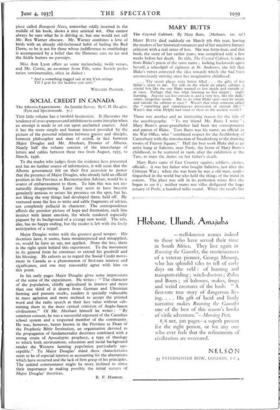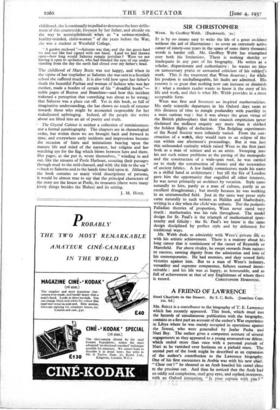MARY BUTTS
The Crystal Cabinet. By Mary Butts. (Methuen. los. 6d.)
MARY Burrs died suddenly on March 5th this year, leaving the readers of her historical romances and of her sensitive literary criticism with a real sense of loss. She was forty-four, and this book, the story of her earlier years, was completed only a few
weeks before her death. Its title, The Crystal Cabinet, is taken
from Blake's poem of the same name ; looking backwards upon herself, a schoolgirl of eighteen at St. Andrews, she felt that Blake's verses conveyed the idea towards which she had been unconsciously striving since her imaginative childhood.
. . . The secret places were better filled . . . the gifts of my father's spirit to me. Yet still on the whole an empty cabinet, a crystal box like the one Blake wanted to live inside and outside of at once. Perhaps that was what learning to live meant ; really learning. Anyone can live outside it, and a very few, like the dulls: saints, altogether inside. But to do what Blake said—and be inside and outside the cabinet at once ? Wasn't that what someone called the " something and simultaneous possession of eternal life ? " Wasn't that what Delphi had tried to show to the ancient world ?
There was another and an interesting reason for the title of the autobiography. " To my friend Mr. Butts I write " ;
Mary Butts's great-grandfather had been the correspondent and patron of Blake. Tom Butts was his name, an official in the War Office, who " combined respect for the Archbishop of
Canterbury with the introduction of Swedenborg to the drawing rooms of Fitzroy Square." Half the best work Blake did as an
artist hung at Salterns, near Poole, the home of Mary Butts's childhood, to be scattered in 1906, after the exhibition at the.
Tate, to meet the duties on her father's death.
Mary Butts came of East Country squires, soldiers, clerics, officials ; it was her father who bought Salterns, just after the Crimean War ; when she was born he was a old man, undis- tinguished in the world but who held the things of the mind in esteem. The place was still in its perfection when first she began to see it ; neither trams nor villas disfigured the huge estuary of Poole, a hundred miles round. When she recalls her
childhood, she is continually impelled to denounce the later defile- ment of this countryside, foreseen by her father, and already on the way to accomplishinent. When as " a serious-minded,
healthy-minded, child-woman " of the years before the War, she was a student at Westfield College.
" A garden enclosed "—Salterns was that, and the fair green land we and our like had signed with our hand. Land we had thrown open—how long would Salterns remain inviolate ? Were we not leaving it open to spoliation, who had blinded the eyes of our under- standing from the day the earth had closed over my father's head.
The childhood of Mary Butts was not happy, and when in the regime of her stepfather at Salterns she was sent to a Scottish school she suffered much. It is also told how upon her father's
death the beautiful Puritan and woman of fashion who was her mother, made a bonfire of certain of his " dreadful books"—
noble pages of Burton and Brantome—and how this incident wakened a perception that something was about to be wrong; that Salterns was a place cut off. Yet in this book, so full of imaginative understanding, she has shown no touch of rancour towards those who might be accounted responsible for her maladjusted upbringing. Indeed, all the people she writes about are lifted into an air of poetry and truth.
- The Crystal Cabinet is neither a collection of reminiscences nor a formal autobiography. The chapters are in chronological
order, but within them we are brought back and forward in time, and everywhere early incidents and impressions become the occasion of hints and intimations bearing upon the mature life and mind of the narrator, her religion and her watching eye for the flag which blows between here and there. Her pages, as she put it, wrote themselves, " winding in and out, like the streams of Poole Harbour, scouring their passages through mud to the mid-channel, and with the tide to the sea " —back to Salterns and to the hands time laid upon it. Although the book contains so many vivid descriptions of persons, it would be almost true to say that the principal characters of the story are the house at Poole, its treasures (there were many . lovely things besides the Blakes) and its setting.
J. M. Hose.











































 Previous page
Previous page